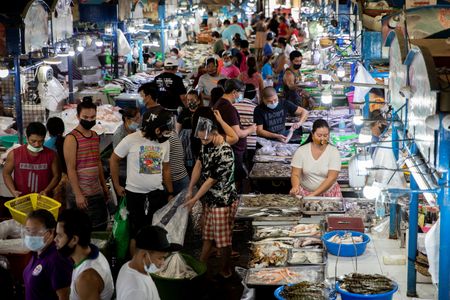 1
1 1
1

By Neil Jerome Morales and Enrico Dela Cruz
MANILA (Reuters) – Philippine annual inflation surged to a 14-year high in November driven mainly by higher food prices, the statistics agency said on Tuesday, with the pickup in prices seen supporting the case for a half-percentage point interest rate hike this month.
The consumer price index (CPI) rose 8.0% in November from a year earlier, higher than the previous month’s 7.7% and the 7.8% forecast in a Reuters poll, but within the central bank’s 7.4%-8.2% forecast for the month.
Costlier vegetables drove food inflation up to 10.0% in November from a year earlier, the fastest pace since September 2018, due to supply constraints caused by a typhoon.
Excluding the volatile food and energy components, the core CPI rose 6.5%, faster than October’s 5.9%.
Following the data’s release, the Bangko Sentral ng Pilipinas (BSP) reiterated it “remains prepared to take all further monetary policy actions necessary to bring inflation back to a target-consistent path over the medium-term.”
Year-to-date inflation stood at 5.6%, well outside the central bank’s 2%-4% target for the year.
The Philippine central bank has raised rates six times this year including two 75-basis point increases in July and November, and its governor last week flagged another 25 basis points or 50 basis points hike at the Dec. 15 meeting.
ING economist Nicholas Mapa said the central bank would likely opt for a 50-basis point rate hike this month, which would take the policy rate to 5.50%.
“Demand side pressures persist with revenge spending related items like restaurant and personal services seeing higher inflation,” Mapa said in a message on Twitter.
(Reporting by Neil Jerome Morales and Enrico dela Cruz; Writing by Karen Lema; Editing by Ed Davies)